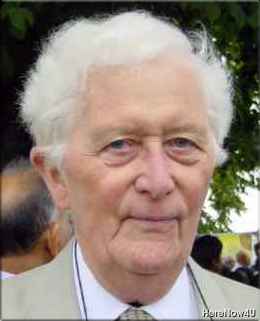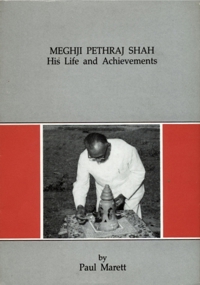
One can imagine the mixed feelings with which young Meghjibhai landed in Mombasa on that July day nearly seventy years ago. The wonder and excitement at seeing this new land so far from home and so different, the sense of achievement at having realized his long-held ambition to travel and see the world, the challenge of setting out on a new career, mingled with sadness at leaving his parents, his wife, his brother and sister, and his childhood friends, whom he might well not see again for many years. But this was only the beginning: the future faced him, exciting, challenging, but perhaps a little frightening, for his whole family depended on this adventure.
The Great War had just ended. With the Allied victory 'the former German colony of Tanganyika had been placed by the League of Nations under British control. With the British already established in Kenya and Uganda this large and fertile region was enjoying peace and stability. In these conditions businessmen were attracted there. Trade and enterprise were encouraged. The Indian population of these three countries was on the increase. Many had come from Kathiawar, Gujarat and the Bombay region, Jains, particularly of the Oshwal caste, Hindus from the Lohana and Patidar castes, Muslim Khojas, Memans, as well as members of other communities. Many found employment without difficulty in the government services or in private firms. Others, perhaps with only two, three or four years of schooling behind them, started up as pedlars in the towns and cities, buying small quantities of goods which they hawked around the streets and houses. As they progressed they set up shops and perhaps would enter the export business, buying local products wholesale and exporting them. The people of Gujarat and Kathiawar had a reputation for commercial ability. In East Africa opportunities were wide open for the enterprising trader to prosper without having to face serious competition from established businesses. Relations between the Indians on the one hand, and the British officials, businessmen and settlers on the other, were generally good. Equally, the Indians lived and worked harmoniously amongst the indigenous African population, learning to speak Swahili, the lingua franca of much of the region, and providing necessary shops for the local communities and markets for the local products.
Meghjibhai had already been promised a job. The arrangements for him to come to Mombasa had been made by Hemraj Ladha Shah, a relative of his. Hemrajbhai was manager of the firm of Kanji Mepa and Co. in Mombasa. This firm had a good reputation and a large-scale business at the time and through Kanji Mepa's partner, Premji Virji Virani, who was manager of another respected company, Imtiazali and Son, had connections with this latter firm. Both companies were based in the same premises in Mombasa. Hemrajbhai felt that Meghjibhai would gain valuable experience there and he was confident that the youth would prove suitable. So Meghjibhai was employed as a bookkeeper on a yearly contract: his pay was to be 250 rupees a year (plus board and lodging) in the first year, and 350 rupees in the second. This was considerably more than double his pay as a teacher. (At that time the Indian rupee was widely used as a currency in East Africa.) It was a good salary for those days and, of course, offered much better prospects.
Nevertheless, it was not an easy job, which Meghjibhai had taken on. Although he was bright and intelligent and had a natural flair for figures, neither his schooling nor his short period as a teacher had given him any experience of accounts. Indeed he had never seen an account book and the complicated accounts of the large firm, which employed him, were very confusing at first. There is no doubt that the key to a firm' s business is to be found in its accounts books. No one can understand the risks and rewards of any new business undertaking without a sound knowledge of accountancy. Meghjibhai was full of confidence. He was totally inexperienced but he was sure that with hard work he would master the secrets of the account books. He took up the post of bookkeeper without hesitation. He was fortunate in getting tuition from Banji Bhavani, an acquaintance of his. He took two or three months to grasp the fundamentals of the subject but before long he had a good mastery of accounts and at the same time had developed those arithmetical skills so necessary in trade. The knowledge and expertise, which he gained at this stage, were to stand him in good stead throughout his life. He was already ambitious, determined not to return to India until he had earned wealth and a respected name. Although perhaps it was not evident at that stage (except in the dreams of a fifteen-year old boy) he was taking the first steps in the career of a future industrialist and businessman.
But the early years were not easy. In his new job the hours were long and the work laborious. His day started at six in the morning when he had to be in the shop to sweep up and dust the stock. His hours were not fixed so it was often late in the evening by the time he finished work. He then had to settle down to his studies of accountancy. It was a period of grinding hard work but it taught him something, which he was to remember all his life, that happiness and prosperity are not possible without discipline and effort. Indeed, wealth acquired easily without hard work and self-discipline slips away easily as well. The person who has not toiled and struggled for his wealth is likely to be no more careful and disciplined in guarding it. Self-discipline and effort remain important throughout life. These early years of struggle seem to have moulded Meghjibhai's character for, in later years, he was to show this same capacity for self-control and constant hard work, even, it must be admitted, to the exclusion of many of those outside interests which provide a welcome relief for many a prosperous businessman.
Meghjibhai worked hard. The long hours were physically demanding but he accepted the challenge and responded with sustained hard work. He was still only a boy (a 'teenager' we would call him nowadays) but he was mature enough to appreciate the need to start as he meant to go on. He was meticulous in his work, and scrupulously honest (a virtue not always found in the business community at that time), and he was prepared to put in long hours. His first two years with the company were by way of being an apprenticeship during which he thoroughly mastered his job and learned the intricacies of the firm's business. His employers were more than satisfied with him.
At the end of the two years the head of the firm called Meghjibhai into his office. Meghjibhai thought that he was to receive a mild rebuke for some small mistake he had made. He was not unduly worried, as he knew that his employers were very satisfied with him. A friendly smile on the partner' s face allayed any fear, which Meghjibhai might have felt and when he was politely asked to take a seat he guessed at first that he was to be entrusted with important new duties.
'We are all highly satisfied with your work', his employer said. Meghjibhai courteously acknowledged the compliment.
'You have now completed two years in our firm'.
'Yes, Sir'.
'Most of our employees ask for an increase of salary when they have been with us for only three or four months, whilst you have gone on working ungrudgingly for the same pay'.
'Salary increases should be the result of merit', said Meghjibhai.
'Yes', replied his employer 'and for that reason we have decided to increase your salary. We have decided to fix your salary for the coming year not at three and a half hundred rupees but at fifteen hundred rupees'.
Meghjibhai started with astonishment. The previous year he had received an increase of a hundred rupees without asking for it so he had been hopeful of getting perhaps another increase of a hundred rupees. This huge increase was beyond anything he could possibly have imagined. He found words to thank his employer and walked out of the office in a daze.
Such news spreads fast and soon everybody knew about it: Meghjibhai was the talk of the Asian community in Mombasa. When his parents received the news they were overjoyed. Doubtless they had been confident that their son would be successful but they never dreamed that his enterprise and efforts would be rewarded so soon.
 Dr. Paul Marett
Dr. Paul Marett

